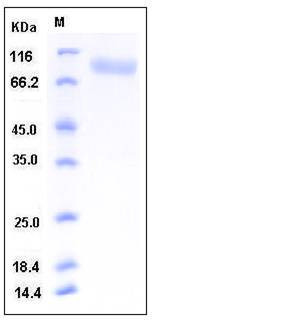| Catalog Number |
P50408-M08H |
| Organism Species |
Mouse |
| Host |
Human Cells |
| Synonyms |
C85791,Cd31,Pecam,PECAM-1 |
| Molecular Weight |
The secreted recombinant mouse PECAM1 consists of 584 amino acids and has a calculated molecular mass of 66 kDa. The apparent molecular mass of the recombinant protein is approximately 85-95 kDa in SDS-PAGE under reducing conditions. |
| predicted N |
Glu 18 |
| SDS-PAGE |
 |
| Purity |
> 93 % as determined by SDS-PAGE |
| Protein Construction |
A DNA sequence encoding the mouse PECAM1 (NP_033868.3) extracellular domain (Met 1-Lys 590) was expressed, with a C-terminal polyhistidine tag. |
| Bio-activity |
|
| Research Area |
Developmental Biology |Embryogenesis |Germ Layer Formation |Mesoderm Marker |
| Formulation |
Lyophilized from sterile 137 mM NaCl, |
| Background |
The Cluster of Differentiation 31 (CD31) adhesion molecule, also known as platelet-endothelial cell adhesion molecule-1 (PECAM-1), is the only known member of the CAM family on platelets. CD31 protein is a 130-kDa transmembrane glycoprotein expressed by endothelial cells, platelets, monocytes, neutrophils, and certain T cell subsets. CD31 protein is also expressed in certain tumors, including epithelioid hemangioendothelioma, other vascular tumors, and histiocytic malignancies. CD31 plays a key role in removing aged neutrophils and tissue regeneration. CD31 protein mediates the homotypic or heterotypic cell adhesion by binding to itself or the leukocyte integrin αvβ3, and thus plays a role in neutrophil recruitment in inflammatory responses, transendothelial migration of leukocytes, as well as in cardiovascular development. |
| Reference |
Deaglio S, et al. (2000) CD38/CD31, a receptor/ligand system ruling adhesion and signaling in human leukocytes. Chem Immunol. 75: 99-120. Kohler S, et al. (2009) Life after the thymus: CD31+ and CD31- human naive CD4+ T-cell subsets. Blood. 113(4): 769-74. |

